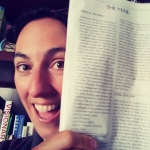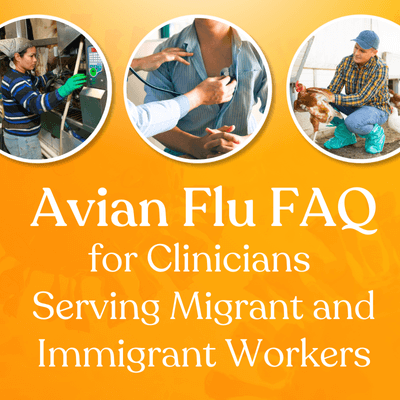Streamline: #MeToo in the Fields: New Video and Curriculum to Eliminate Agricultural Worker Sexual Harassment

Cast and crew of training video filming. Yakima, WA | September 2019
[Editor’s Note: This article, reprinted from the winter issues of Streamline, MCN’s in-print quarterly publication, reviews a new set of resources to battle sexual harassment in the fields of Washington State. As agricultural workers head back into the fields to plant and harvest spring’s bounty, these resources may be helpful in preventing sexual assault, in Washington State and around the country.]
By Claire Hutkins Seda, Writer, Migrant Clinicians Network and Managing Editor, Streamline
When the #MeToo movement exploded into the national dialogue two years ago, Victoria Breckwich Vásquez, DrPH, MPH, Chair of the Washington Coalition to Eliminate Farmworker Sexual Harassment, feared that the movement was leaving out low-wage workers. “We felt something more was needed: specific conversations around farmworker health and safety in the workplace,” she said. “Despite nationwide efforts and lots of publicity and media, there is ongoing violence towards farmworker women and men that was going unrecognized and not talked about.”
Four years prior, Dr. Breckwich Vásquez had started labeling sexual harassment as an occupational health issue. Dr. Breckwich Vásquez was then working at the Pacific Northwest Agricultural Safety & Health Center (PNASH) at the University of Washington (UW), and as part of Yakima-based El Proyecto Bienestar, a collaboration between UW, Radio KDNA/NCEC, Yakima Valley Farmworkers Clinic and Heritage University. There, she conducted trainings with agricultural worker women on pesticides and other workplace hazards. A few agricultural worker women and a PNASH field staff person approached her to ask if she considered sexual harassment a health and safety issue, since that was on everyone’s minds, “and I stood there, without answers,” she admitted. “We proceeded to do our research, and no agricultural centers were addressing sexual harassment as an occupational health issue.
“Mostly, it’s seen as a legal issue -- that an agricultural worker should file a complaint and get a lawyer,” she continued. “But it’s preventable, and so we focused on that: on prevention at the worksite… Going to work exposed [agricultural workers] to huge risks of being assaulted sexually.” As the #MeToo movement broke, she and her colleagues pushed for attention on the rampant sexual harassment that primarily agricultural worker women, gender nonconforming workers, and some agricultural men, had complained about for decades -- and advocated for prevention strategies.
One of the early projects that El Proyecto Bienestar worked on was to write a script for a radionovela that agricultural worker women developed from their own experiences. Later, that script and another developed for a popular theater project with the state’s Department of Agriculture were the basis for a video script. Together with a companion curriculum, this would be used to train supervisors, growers, and agricultural workers on sexual harassment. She recalled a conversation with a grower who sat on a grower advisory committee. He told her, “What I need, and my members need, is a tool for training. We can talk and talk about this being a thing they shouldn’t do, but we don’t have a way to reach them in their language, we have no tools available. We have some lawyers giving presentations, but it’s not interesting or engaging -- what can we do to get a video?” A subcommittee formed and began work on a video, building a script based on true stories that committee members shared (as agricultural women have been a part of every process), and developing a curriculum around the script.
The video’s audience is wide: “The supervisors were frequently the perpetrators. Growers were ultimately responsible for worker health and safety and held legally responsible. Farmworkers were suffering from the inaction,” so the video is geared for all three, Dr. Breckwich Vásquez explained.
As the #MeToo movement continued to peel back the rampant harassment that women face, growers -- who just a few years before were reluctant to support her work -- were now supporting the video efforts as donors. PNASH, Equitable Food Initiative and a UW Royalty Research grant, with Dr. Jody Early as principal investigator, were key as early funders. Individual and organizational donations by state agencies, growers and supportive organizations buoyed the two-year-long process. The Washington Coalition to Eliminate Farmworker Sexual Harassment grew out of that work. Bringing together people with backgrounds in agricultural work, academics, policy, and advocacy, the coalition began to meet regularly to discuss and coordinate the diverse efforts around the state to eliminate sexual harassment in the agricultural industry.
In the summer of 2019, after the script got feedback from agricultural workers, community members, and attorneys, the coalition contracted with Latino Northwest Communications to do the filming. “They recruited great actors, and worked with us on the script on the set,” she said. The film wrapped up and was released in late November.
“A fifteen-minute video isn’t going to change behavior,” Dr. Breckwich Vásquez admitted. “We built a training that used the video as a tool, to have these kinds of discussions in the workplace.” The video is now available for free, and the companion curriculum is available for the cost of shipping and handling.
The main character, Juana, is named after Dr. Breckwich Vásquez’s mother, who moved from Peru to escape a difficult family life, to work as a nurse in Los Angeles. Dr. Breckwich Vásquez recognizes her mother’s own fierce motivation and unending energy in the agricultural women she works with who generously shared their own difficult stories in hopes of making change. “[Juana, the main character, shows] amazing vulnerability during certain parts of the video, but she knows her work, her value, and she speaks justice and she keeps going, she doesn’t turn back,” Dr. Breckwich Vásquez said. “So many farmworker women have that same sense of justice -- they just want others to not experience what they went through.”
Access the video and order the curriculum at: https://deohs.washington.edu/pnash/toolkit
Read more about PNASH’s work on prevention of sexual harassment in agriculture: https://deohs.washington.edu/pnash/sexual-harassment
Connect with the Washington Coalition to Eliminate Farmworker Sexual Harassment on Facebook: https://www.facebook.com/WCEFSH/
The Power and Control Wheel for immigrant women, in English and Spanish, is a great resource for use in the exam room, from Futures Without Violence: https://www.futureswithoutviolence.org/power-and-control-tactics-used-against-immigrant-women/
Casa de Esperanza is a nonprofit national resource center focused on sexual violence with culturally appropriate and engaging resources in English and Spanish. Health centers can present Spanish-language signage to encourage those suffering from abuse to get help; Casa de Esperanza offers a 24/7 bilingual hotline for those needing assistance: 651-772-1611. https://casadeesperanza.org/es/
Like what you see? Amplify our collective voice with a contribution.
Got some good news to share? Contact us on our social media pages above.
Return to the main blog page or sign up for blog updates here.
- Log in to post comments






